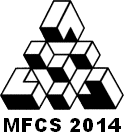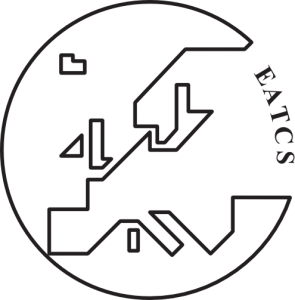
 39th International Symposium on
39th International Symposium on
Mathematical Foundations of Computer Science
MFCS 2014
Budapest, August 25-29, 2014
www.inf.u-szeged.hu/mfcs2014/
The series of MFCS symposia, organized since 1972, has a long and well-established tradition. The MFCS conferences encourage high-quality research in all branches of theoretical computer science. Their broad scope provides an opportunity to bring together researchers who do not usually meet at specialized conferences. Quality papers presenting original research on theoretical aspects of computer science are solicited.
Principal topics of interest include (but are not limited to): algorithms and data structures (incl. sequential, parallel, distributed, randomized, approximation, graph, network, on-line, parameterized, optimization algorithms), algorithmic game theory, algorithmic learning theory, computational complexity (structural and model-related), computational geometry, models of computation, networks (incl. wireless, sensor, ad-hoc networks), parallel and distributed computing, quantum computing, automata, grammars and formal languages, combinatorics on words, trees, and other structures, bioinformatics, computer-assisted reasoning, concurrency theory, cryptography and security, databases and knowledge-based systems, formal specifications and program development, foundations of computing, logic, algebra and categories in computer science, types in computer science, mobile computing, semantics and verification of programs, theoretical issues in artificial intelligence.
Invited speakers: Krishnendu Chatterjee (IST Austria, Klosterneuburg, Austria), Achim Jung (U. of Birmingham, UK), Dániel Marx (Hungarian Academy of Sciences, Budapest, Hungary), Peter Bro Miltersen (Aarhus U., Denmark), Cyril Nicaud (U. Paris-Est, Marne-la-Vallée, France), Alexander Sherstov (UCLA, Los Angeles, USA), Christian Sohler (TU Dortmund, Germany).
Program committee: Albert Atserias (UPC, Barcelona, Spain), Giorgio Ausiello (U. “La Sapienza”, Rome, Italy), Jos Baeten (CWI, Amsterdam, The Netherlands), Therese Biedl (U. of Waterloo, Canada), Mikołaj Bojańczyk (Warsaw U., Poland), Gerth Stølting Brodal (Aarhus U., Denmark), Christian Choffrut (U. Paris Diderot, France), Erzsébet Csuhaj-Varjú (Eötvös Loránd U., Budapest, Hungary, co-chair), Rocco De Nicola (IMT Lucca, Italy), Martin Dietzfelbinger (TU Ilmenau, Germany, co-chair), Manfred Droste (U. of Leipzig, Germany), Robert Elsässer (U. Salzburg, Austria), Zoltán Ésik (U. of Szeged, Hungary, chair), Uli Fahrenberg (Irisa/INRIA Rennes, France), Fedor V. Fomin (U. of Bergen, Norway), Fabio Gadducci (U. of Pisa, Italy), Anna Gál (U. of Texas, Austin, USA), Dora Giammarresi (U. “Tor Vergata”, Rome, Italy), Roberto Grossi (U. of Pisa, Italy), Anupam Gupta (CMU, Pittsburgh, USA), Michel Habib (U. Paris Diderot, France), Kristoffer Arnsfelt Hansen (Aarhus U., Denmark), Edith Hemaspaandra (RIT, Rochester, USA), Kazuo Iwama (Kyoto U., Japan), Yoshihiko Kakutani (U. of Tokyo, Japan), Juhani Karhumäki (U. of Turku, Finland), Bakhadyr Khoussainov (U. of Auckland, New Zealand), Elias Koutsoupias (U. of Oxford, UK), Rastislav Královič (Comenius U., Bratislava, Slovakia), Jan Kratochvil (Charles U., Prague, Czech Republic), Stefan Kratsch (TU Berlin, Germany), Amit Kumar (IIT, New Delhi, India), Kim G. Larsen (Aalborg U., Denmark), Frédéric Magniez (U. Paris Diderot, France), Ralph Matthes (U. Paul Sabatier, Toulouse, France), Madhavan Mukund (CMI, Chennai, India), Jean-Éric Pin (LIAFA, U. Paris Diderot, and CNRS, Paris, France), Alexander Rabinovich (Tel Aviv U., Israel), Peter Rossmanith (RWTH Aachen U., Germany), Jan Rutten (CWI, Amsterdam, and Radboud U. Nijmegen, The Netherlands), Wojciech Rytter (Warsaw U., Poland), Luigi Santocanale (Aix-Marseille U., France), Christian Scheideler (U. of Paderborn, Germany), Thomas Schwentick (TU Dortmund, Germany), Alex Simpson (U. of Edinburgh, UK), Mohit Singh (Microsoft Research, Redmond, USA), Klaus Sutner (CMU, Pittsburgh, USA), Gábor Tardos (Hungarian Academy of Sciences, Budapest, Hungary), György Turán (U. of Illinois, Chicago, USA), Peter Widmayer (ETH Zurich, Switzerland), Philipp Woelfel (U. of Calgary, Canada).
Important dates:
- Paper submission deadline: April 18, 2014. (midnight, PST)
- Author notification: June 3, 2014.
- Camera-ready deadline: June 16, 2014.
- Conference: August 25-29, 2014.
Submissions to MFCS must not exceed 12 pages (in Springer-Verlag’s Lecture Notes style and including bibliography). If the authors believe that more details are essential to substantiate the main claims, they may include a clearly marked appendix that will be read at the discretion of the program committee. Simultaneous submissions of papers to any other conference with published proceedings or simultaneous or previous submission of the same contribution to journals is not allowed. Only electronic submissions in PDF format are accepted. Information about the submission procedure is available on the conference web page. The proceedings will be published in the ARCoSS subline of Lecture Notes in Computer Science by Springer-Verlag. It is planned to have a special issue of Information and Computation to which journal versions of the best papers are invited.
Contact: ze@inf.u-szeged.hu or csuhaj@inf.elte.hu or martin.dietzfelbinger@tu-ilmenau.de
The conference is organized by the Faculty of Informatics, Eötvös Loránd University, Budapest, and the Department of Foundations of Computer Science, Faculty of Science and Informatics, University of Szeged, in cooperation with EATCS.
